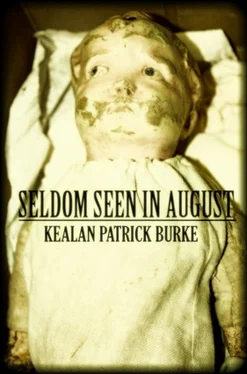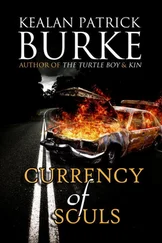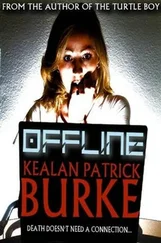“What were you hoping for then?”
“Gradual dawning.”
Wade pondered this a moment, then said, “Well if by “dawning” you mean figuring out your game, then I won, didn’t I? What’s my prize? Few hookers and some Cuban cigars? One-way trip to Mexico?” He grinned, but let it fade when he realized it wasn’t being returned. Cochran suddenly looked all business.
“Wade,” he said, leaning forward again, his palms flat on the table. “You’re a psychopath.”
“That’s kinda strong, isn’t it?”
“It’s fact.”
“Well, so’s the fact that you’re an old fart, but you don’t hear me pointing it out.”
“You killed a man three weeks shy of your fifteenth birthday. There was a boy with you. Do you remember?”
Wade remembered the man clearly, the boy only vaguely.
“Not the kid. Only met him that one time,” he said. “But the guy had it coming.”
“Or so you were told. That he deserved to die. If they’d said the same about anyone, whether it was true or not, you’d have done what they asked of you, wouldn’t you?”
“I suppose so,” Wade said. “It was the way things were.”
“And it was the way you wanted it to be.”
Wade frowned. “Have we entered the psychological evaluation stage of our relationship, Mr. Cochran?”
Cochran ignored him. “The boy’s name was Eddie Scarsdale. Like you, he wanted to be a gangster, wanted some way to make a lot of money so he wouldn’t get mocked at school anymore for having holes in the soles of his shoes, but he didn’t have the chutzpah , the nerve to take the life of another human being. After you killed the old man, he was so distraught, so guilty, he went home and got his father’s straight razor…” He waved a hand in the air. “You know the rest.”
Wade thought of the kid in the bathroom upstairs and shook his head. “So it’s my fault he took the chickenshit expressway?”
Cochran just stared, his face unreadable.
“Whatever,” Wade said. “So who was the old floating bitch in the bedroom?”
“My wife,” Cochran said evenly.
“Whoops.” Wade chuckled. “I’d put my foot in my mouth if it wasn’t tied to the chair.”
“She was never the same after Eddie’s death.”
Despite the lingering skeins of disorientation, Wade was able to connect the dots fairly quickly. “Your wife?”
Cochran nodded.
“So then, this Eddie character was your son?”
“No.”
“All right then, I’m lost.”
“He was already dead by the time I met and married his mother.”
“Gotcha.”
“But I saw how she suffered. Saw how it ate away at her worse than any cancer.” A distant look entered his eyes. “I think she married me just so she wouldn’t be alone. Not sure there was any love there. At least, from her.”
Wade leaned forward as much as his restraints would allow. “Can I interrupt you for a sec?”
Cochran waited.
“Thanks. Um… how did you get the impression from my record, which I assume you’ve read in detail, that I would give a cartwheeling fuck about anything you’ve just told me?”
Cochran shook his head.
“Hey, look, I am sorry about what happened to your…whatever he was to you, and your wife. Really, I am.”
Cochran gave a feeble smile. “Perhaps you should care, Wade. It is, after all, part of the reason you’re here.”
“Okay, so what’s the other part of the reason?”
“Do you know what nanotechnology is?”
“Computer classes for grandmothers?”
“Funny,” the old man said. “But no, it refers to control of matter on the atomic and molecular scale.”
“Sounds fascinating. And is it safe to assume that it also means we’ve moved from psychoanalysis to psychics? Because if we have I’d like to apologize in advance if I nod off during your lecture.”
“In this case, they’re interlinked.”
“Your losing me again.”
“Then I’ll condense it for you,” Cochran said patiently. “In 2000, my company announced a breakthrough in psychotherapy following a fusion of two distinct but radically different departments of the University of Ca—
“Jesus Christ, get to the point already,” Wade said around an exaggerated yawn.
“Very well. What we developed was called “nanoreality”—a means of using nanotechnology to construct realistic visual images, or as you so rightly guessed, “mental holograms” based on the memories of a subject.”
“Interesting,” Wade said, sounding bored. “But it makes me wonder why you felt the need to strap me to a chair when just listening to you would have been enough to bore me into a coma.”
Cochran continued, unfazed. “It was primarily developed as a way for doctors to abandon professional speculation and actually see the trauma in the minds of their patients, as if it were a movie, to witness firsthand the core of the patient’s illness in living color, and therefore treat the patient accordingly. Of course the possibilities didn’t end there. Witnesses afraid to talk, or abuse cases with repressed memories…all of it could be found in the suconscious and projected for observation and study. We could, in essence, see reflections gleaned from the subject’s life. Better yet, a dying man could project images of his killer and we could save them. Better than any mugshot. It stands to turn the justice system as we know it on its ear.”
Wade felt the restraints biting into his wrists. There was a way out of these zip-ties. Someone had told him how to do it once upon a time, but the method eluded him now.
“But like any great discovery, “nanoreality” had its problems, and some pretty significant ones at that. Once access was gained, we found it difficult to isolate the memories we wanted. The mind doesn’t have an index, you see. It’s like a library full of books with no titles. We ended up selecting them at random.” He shook his head. “Which had unfortunate consequences for some of the subjects, otherwise good people who had seen terrible things and had managed to forget them. Essentially we made them relive those nightmares, and of course, when memories are recreated in front of you, they cease to be memories anymore. They become the present, the now. So those who had witnessed or endured tragedies were forced to witness them again. And once the present became the past again, the memory was duplicated, intensifying the level of emotional turmoil. It proved counterproductive, exacerbating the very symptoms were were trying to cure.”
Wade smiled. “So you fucked them up even more, in other words.”
“Yes,” Cochran conceded. “And I’ll spare you the speech about every great advance needing sacrifice. It was my fault. We weren’t ready.”
“But now you are?”
Cochran sat back again and appraised Wade for a long moment. Then he offered him a tight smile. “Yes. Many lives have been lost trying to perfect this thing. The initial project was deemed a failure and shut down until I decided to fund a new version of it. As you might imagine, the old concerns were revived right along with it, but I had done my homework this time. We had planned to go public until someone in my staff leaked word of the project to the press. It was not received well. They accused us of trying to steal the last of mankind’s secrets, invading the only place left the government hadn’t already probed. During this wave of negativity, the government men showed up, stirred from their nest by the media and on the warpath. After an admittedly impressive demonstration, I was able to keep them from shutting us down, but only if I agreed to sign the whole thing over to them when complete, with my role reduced to advisor.”
“That had to suck,” Wade said, grinning.
Читать дальше












